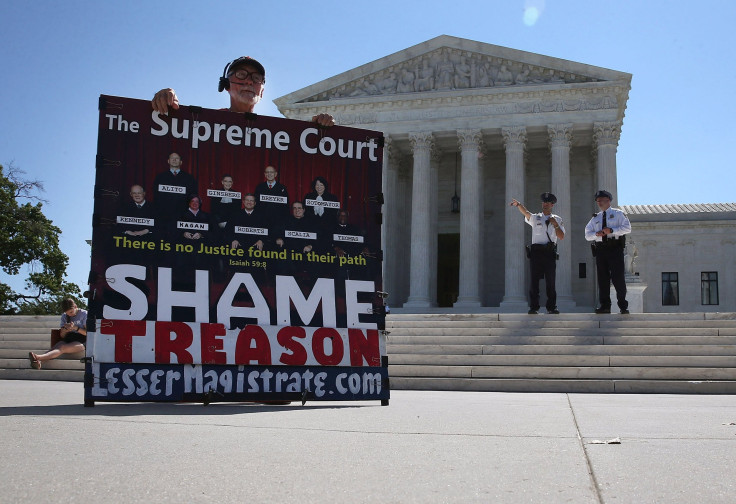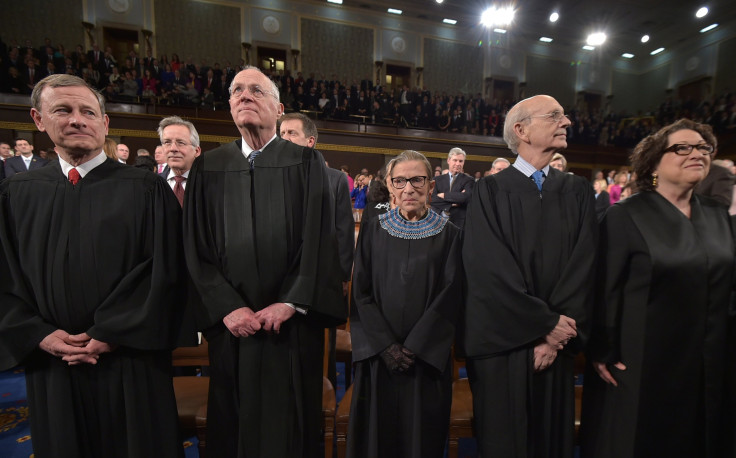Supreme Court Decisions 2015: Republicans, Democrats Unhappy With Justices, But Why?

If the U.S. Supreme Court were a middle school student, it would be sitting alone in the cafeteria. In the wake of recent landmark decisions on same-sex marriage and the Affordable Care Act, negative views of the nation's highest court have reached a 30-year high, according to a Pew Research Center survey published this week.
The public's growing discontent with the Supreme Court comes as the nation has become more politically polarized, practically guaranteeing that the vast majority of court decisions will likely upset a large number of people. An increasing dissatisfaction with political institutions as a whole doesn't help. There has also been increasing speculation over whether the Supreme Court had the jurisdiction to rule over certain subject matter in recent cases, and a slew of 5-4 decisions have made the public uneasy with a fractured court. All this adds up to a wary, upset and frustrated public with little faith in one of the nation's most important institutions.
Many Americans currently have a negative view of the Supreme Court, with 43 percent of citizens viewing the court unfavorably, the highest rating of disatisfication since 1985, Pew found. The survey, conducted from July 14 to 20 among 2,002 adults, found that the unfavorable views came largely from Republicans. Since March, favorable opinions toward the court among Republicans dropped 17 percentage points, from 50 percent to 33 percent, and unfavorable opinion jumped 21 percentage points from 40 percent to 61 percent. The survey also found that 68 percent of conservative Republicans view the court as liberal, the highest percentage since 2007.
Democrats’ opinions of the Supreme Court became more positive since March, although that increase is not nearly as dramatic. Roughly 62 percent of Democrats now have a favorable impression of the court, up from 54 percent. Meanwhile, 49 percent of liberal Democrats view the court as middle of the road.
A More Polarized Country
A spike in political polarization -- the growing gap between Democrats and Republicans -- partly explains the increasingly unfavorable opinion of the Supreme Court. A report from Pew Research Center in 2014 found that partisan antipathy is deeper and more extensive than at any point in the last two decades. After recent landmark decisions that benefited Democratic causes, such as protecting the Affordable Care Act and legalizing same-sex marriage, and with fewer moderate Republicans, it's not hard to understand why public opinion of the Supreme Court is at an all-time low.
“Given the political polarization of our country at the moment, the court upsets half the population either way it goes,” said Ilya Shapiro, a senior fellow in constitutional studies at the Cato Institute, a think tank in Washington, D.C., that conducts nonpartisan research on a wide range of policy issues, and editor-in-chief of the Cato Supreme Court Review. “It’s clearer now than in the past what side people belong to. Certainly, the political trends in the country as a whole are very important in reactions to Supreme Court cases.”
Tom Giovanetti, president of the Institute for Policy Innovation, a think tank in Irving, Texas, that focuses on nonpartisan solutions to public policy problems, said many Republicans feel the Supreme Court, with its conservative majority, has failed them.
“A big part of conservative strategy over the years has been the importance of controlling the White House in order to get Republican-appointed judges. That was the justification for turning out and to vote, even if you don’t like the candidate,” Giovanetti said. “The Republicans are upset because they feel as if that strategy hasn’t worked.”
Negative Views of Supreme Court at Record High http://t.co/Do8BmMzYBq
— Miroslav Georgiev (@mirogeorgiev97) July 29, 2015At the same time, many Democrats aren't really warming up to the court, despite its recent liberal rulings. Sandra Davidson, a communications law professor at the University of Missouri, said there is an overall countrywide distrust in political institutions, regardless of party affiliation, and that the Supreme Court is no exception.
“I wonder if this is just an indication of a broader problem, which is a lack of respect for our political institutions across the board, a dip in public confidence in the presidency, in Congress, in our political parties,” Davidson said. “I think there is concern about the way we are doing elections. We’ve had all these videos showing extreme police misconduct. I wonder if perhaps this lack of respect for institutions and officials … is this just a trend for the court, or is it a symptom of a more general malaise, a more general distress in our political institutions?”
Too Much Power?
While landmark decisions are nothing new, the nature of recent rulings has also negatively affected the image of the Supreme Court. In a slew of 5-4 rulings in major cases in recent years -- Bush v. Gore (2000), Citizens United (2010), and this year's rulings on same-sex marriage and the Affordable Care Act -- citizens are becoming increasingly uneasy with the notion that one person is, essentially, deciding major issues.
“You have nine people who hold so much power,” Davidson said. “When you have these 5-4 decisions, you have one person deciding a controversial, major matter, and we are talking about matters that affect very important parts of our lives: political process, political advertising, marriage and healthcare. These are issues that perhaps affect more people than the more obscure rulings [in the past] that might not have affected people in their day-to-day lives.”

In controversial decisions such as the same-sex marriage case, which was slammed by many religious leaders, and Bush v. Gore, which decided the presidency, people have also become increasingly skeptical about whether the Supreme Court has the authority to rule over such cases. Retired Supreme Court Justice Sandra Day O’Connor recently suggested the Supreme Court should have not ruled on the Bush v. Gore case, which sent George W. Bush to the White House.
“Judicial power shall extend to all cases, in law and equity,” the U.S. Constitution reads. That could be interpreted to mean religious, political and other issues fall outside the court's jurisdiction, Davidson said.
Republicans especially seem convinced that the Supreme Court has acted beyond its purview in more recent rulings. “Over the last couple of days, our country has seen two of the most blatant, disturbing, disgusting examples of judicial activism in the history of these United States,” Republican presidential candidate Mike Huckabee, a former governor of Arkansas, said in a speech last month, the Hill reported.
Giovanetti said he foresees the Supreme Court becoming a major topic during the upcoming Republican presidential debates.
More Access To Information
Another reason why people might like the Supreme Court less these days is because we know more about the traditionally secret court than ever. Thirty years ago, the Internet and social media did not exist, and the landscape of the dissemination of information looked a lot different.
“We’ve got all these forms of communication where people can kind of plug into their little niche, so you have some very negative websites you can plug into,” Davidson said. “Some websites can be very critical of the Supreme Court, and people can visit those repeatedly.”
Shapiro said sites like Facebook and Twitter haven't helped the Supreme Court's popularity. “With technology and the way that information is distributed, more people hear about opinions -- for example, you have echo chambers on social media -- and I think the mobilization of everything has accentuated those opinions these days,” Shapiro said. “I think you have people who, in the past, might not have heard about certain issues that are hearing about them now.”
Future Opinion
So what can the Supreme Court do to win back America's respect? Millennials, an increasingly important voting demographic, will likely play a big role in shaping public opinion of the court over the next few decades, experts said.
“It’s hard to tell what will happen to the future public opinion of the Supreme Court. It really depends on what the court does,” Shapiro said. “Who knows how millennials’ opinions will change the overall public opinion. They are less tied to traditional parties, so there’s a bit of a wild card there.”
With King v. Burwell, here's a public opinion primer of SCOTUS & the health care law http://t.co/LDFHJ2K4gP pic.twitter.com/SWp8VXMdDF
— PewResearch FactTank (@FactTank) March 4, 2015Davidson said the future of public opinion toward the Supreme Court also will rely heavily on the outcome of the 2016 election. She noted that many of the Supreme Court justices are advancing in age, and some could choose to retire from their lifetime appointments during the next presidential term. That possibility could be a huge factor for some voters when they decide which candidate to support.
“Arguably one of the most important aspects of the next presidential election will be that the president will be making a difference in the court (by appointing the new justices)… the bottom line for some voters will be ‘Who do we want appointing the next Supreme Court officials?’" Davidson said.
© Copyright IBTimes 2024. All rights reserved.






















